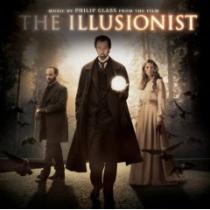
SOUNDTRACKS
Soundtracks are a lot more than movie music...
...or so I'm ready to argue as a 30 year devotee of this sorely under appreciated genre. So, in an effort to do my part, each week
I'll be making recommendations of soundtracks current and vintage, make a fuss over long awaited soundtrack scores finally getting
a well deserved release, and in general, make some noise about this often overlooked category. Beyond my long experience as a
listener and as a pianist and songwriter, both of which I've put to use in writing a quarterly soundtrack column for the Chicago
Tribune, I can only offer my recommendations. You'll discern my taste soon enough and upfront I'd like to make it clear that I'll
focus most heavily on SCORE soundtracks. In the end, all criticism is subjective but if I can point a listener toward a little heard
soundtrack or strongly advise you to either ORDER IMMEDIATELY or SKIP ALTOGETHER, all the better.
...or so I'm ready to argue as a 30 year devotee of this sorely under appreciated genre. So, in an effort to do my part, each week
I'll be making recommendations of soundtracks current and vintage, make a fuss over long awaited soundtrack scores finally getting
a well deserved release, and in general, make some noise about this often overlooked category. Beyond my long experience as a
listener and as a pianist and songwriter, both of which I've put to use in writing a quarterly soundtrack column for the Chicago
Tribune, I can only offer my recommendations. You'll discern my taste soon enough and upfront I'd like to make it clear that I'll
focus most heavily on SCORE soundtracks. In the end, all criticism is subjective but if I can point a listener toward a little heard
soundtrack or strongly advise you to either ORDER IMMEDIATELY or SKIP ALTOGETHER, all the better.
Looking over minimalist composer Philip Glass’ film scoring resume on IMDB I’m surprised to
find so many varied assignments. For every culture steeped movie (Koyaanisqatsi and its
sequels for example), there’s something more populist (like The Truman Show, Secret Window
and Candy Man) to balance it.
Now with The Illusionist Glass has composed a score for a movie that falls somewhere in
between. This wonderful movie is so old fashioned that it may appear to be something new
to younger film audiences. And Glass’ score gives the movie a dark magic all its own. Like
all the other great modern composers who have dabbled in film composition (Aaron Copland
for example), Glass’ scores are wonderful listening experiences on their own, unencumbered
by the need to have seen the movies they were written for. With one vivid exception, the
reverse has held true for me (that would be Glass’ score for Dracula – if ever a movie called
for a schlock score that was it).
Much of Glass’ work is so purposely redundant and asymmetrical that it seems all of a whole
and his music for The Illusionist is no exception. This is not to imply that the redundancy of
his music – with his major/minor intervals, tweeting flutes, and thumping brass – is less than
thrilling. Rather, it seems a long, continuous score – as if we have jumped right from the
End Titles of Candyman to the opening tracks (there are 21 in all) of this score. Glass
employs the same techniques that inhabit all his scores and if this thrilling soundtrack
doesn't have quite the originality of his very erudite masterpieces Koyaanisqatsi, Anima Mundi,
The Thin Blue Line, and Mishima, nevertheless, minimalist music fans will be well content with
this gorgeous addition to the Glass canon. On Rykodisc.
+++++++++++++++++++++++++++++++++++++++++++++++++++++++++++++++++
Don't forget to check out previous soundtrack recommendations by visiting the ARCHIVES
Next Week: TBA
find so many varied assignments. For every culture steeped movie (Koyaanisqatsi and its
sequels for example), there’s something more populist (like The Truman Show, Secret Window
and Candy Man) to balance it.
Now with The Illusionist Glass has composed a score for a movie that falls somewhere in
between. This wonderful movie is so old fashioned that it may appear to be something new
to younger film audiences. And Glass’ score gives the movie a dark magic all its own. Like
all the other great modern composers who have dabbled in film composition (Aaron Copland
for example), Glass’ scores are wonderful listening experiences on their own, unencumbered
by the need to have seen the movies they were written for. With one vivid exception, the
reverse has held true for me (that would be Glass’ score for Dracula – if ever a movie called
for a schlock score that was it).
Much of Glass’ work is so purposely redundant and asymmetrical that it seems all of a whole
and his music for The Illusionist is no exception. This is not to imply that the redundancy of
his music – with his major/minor intervals, tweeting flutes, and thumping brass – is less than
thrilling. Rather, it seems a long, continuous score – as if we have jumped right from the
End Titles of Candyman to the opening tracks (there are 21 in all) of this score. Glass
employs the same techniques that inhabit all his scores and if this thrilling soundtrack
doesn't have quite the originality of his very erudite masterpieces Koyaanisqatsi, Anima Mundi,
The Thin Blue Line, and Mishima, nevertheless, minimalist music fans will be well content with
this gorgeous addition to the Glass canon. On Rykodisc.
+++++++++++++++++++++++++++++++++++++++++++++++++++++++++++++++++
Don't forget to check out previous soundtrack recommendations by visiting the ARCHIVES
Next Week: TBA
Master of minimalism Philip Glass
has added another section to his
one and the same, never ending
film score with the mysterious music
for The Illusionist.
has added another section to his
one and the same, never ending
film score with the mysterious music
for The Illusionist.


